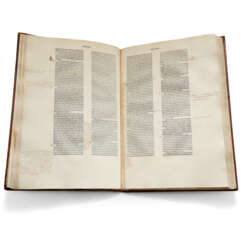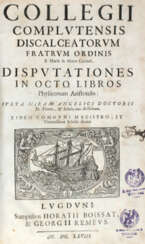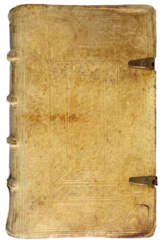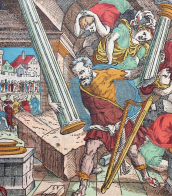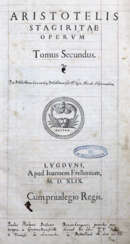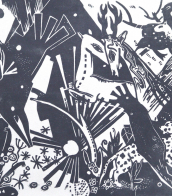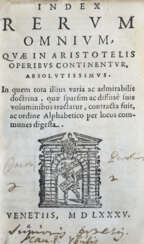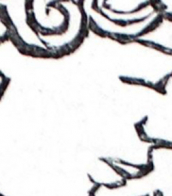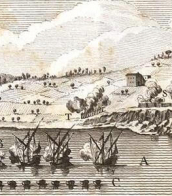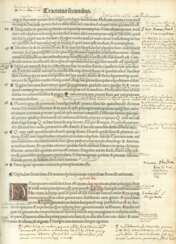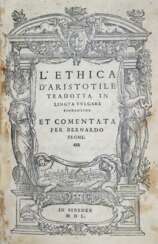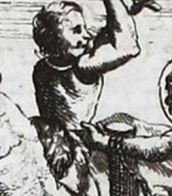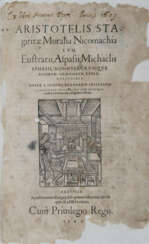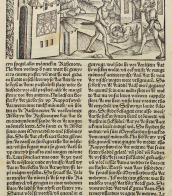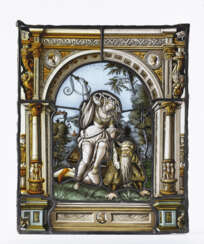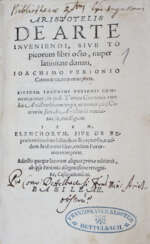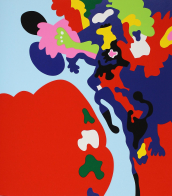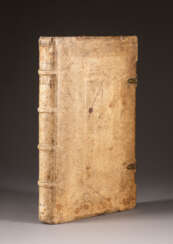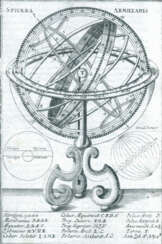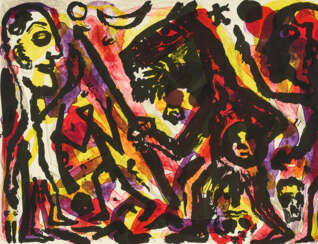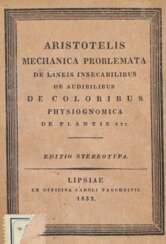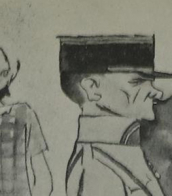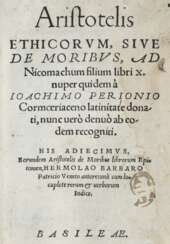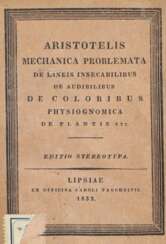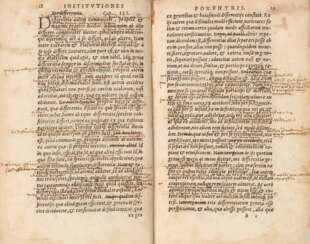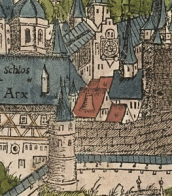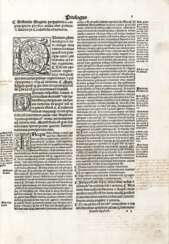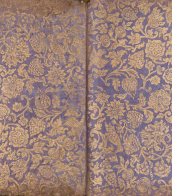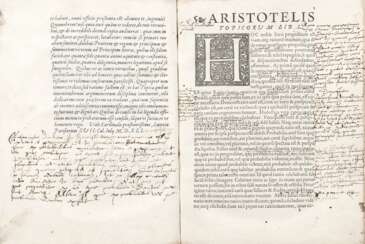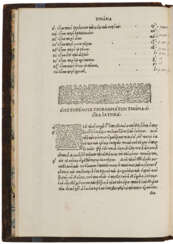aristoteles
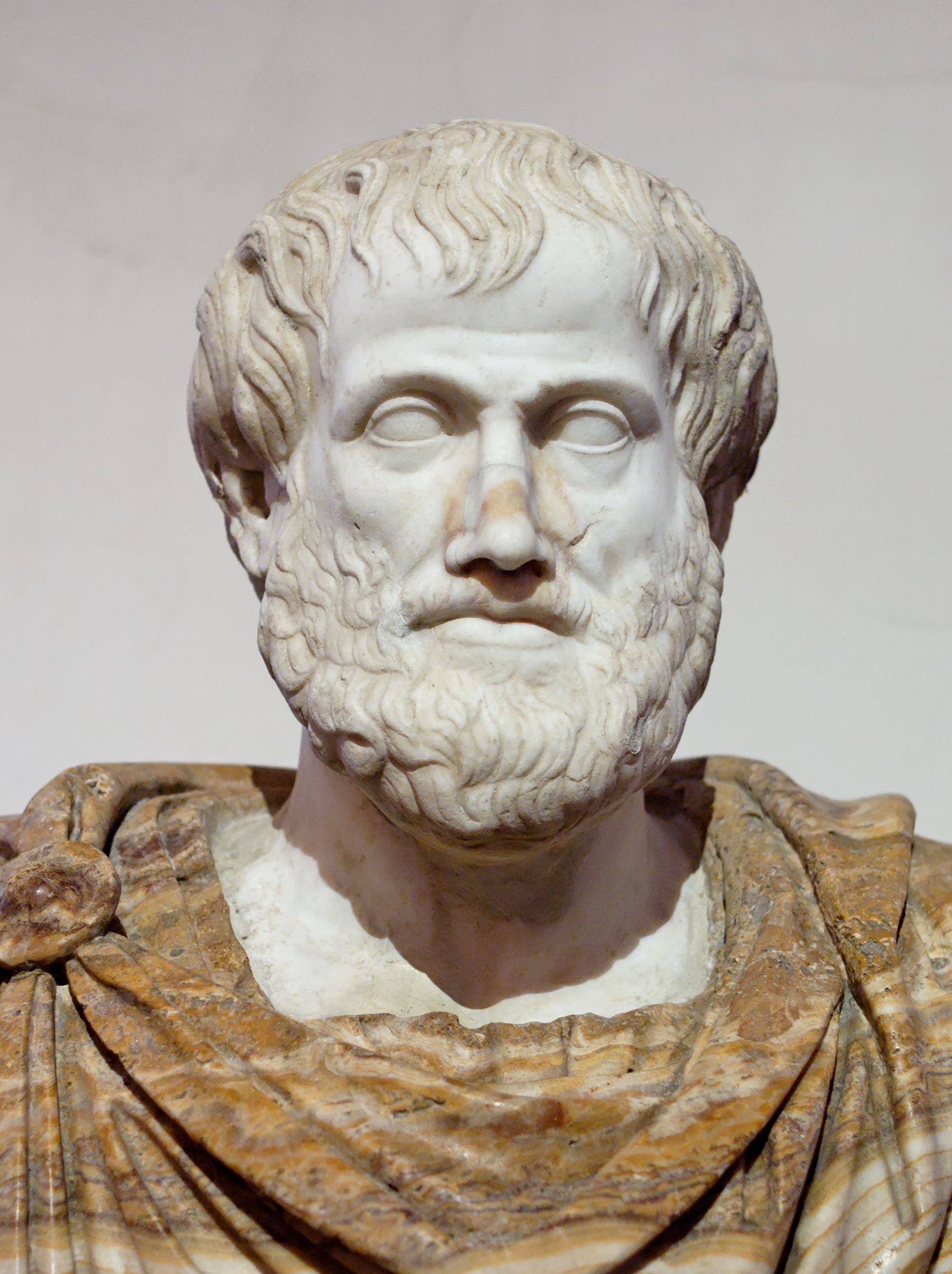
Aristotle (Greek: Ἀριστοτέλης) was an Ancient Greek philosopher and polymath, renowned for his profound impact on Western philosophy and science. Born in Stagira, Chalcidice, Aristotle's intellectual ventures spanned a multitude of subjects, including but not limited to physics, metaphysics, poetry, theater, music, logic, rhetoric, politics, government, ethics, biology, and zoology.
Educated in Plato's Academy in Athens, Aristotle distinguished himself as a scholar of vast knowledge and influence. His foundational works laid the groundwork for the development of modern science, while his teachings on logic and the syllogistic method continue to resonate in the realm of philosophy. As the tutor of Alexander the Great and the founder of the Lyceum in Athens, Aristotle's legacy extends beyond his prolific writings, with his teachings shaping medieval scholarship and influencing both Judeo-Islamic and Christian theologies.
Among Aristotle's notable works, his treatises such as "Nicomachean Ethics," "Politics," "Metaphysics," and "Poetics" have been studied for centuries. His concept of the "Golden Mean," advocating for a balanced and moderate approach to life, remains a cornerstone of ethical philosophy. His ideas on the "Prime Mover" and empirical evidence as a basis for understanding the world laid the foundation for scientific inquiry. Although only about a third of his original output has survived, Aristotle's contributions continue to be a subject of academic study and admiration.
For collectors and experts in art and antiques, the philosophical and scientific principles of Aristotle's works are not just historical artifacts but living ideas that continue to shape our understanding of the world and our place within it. His insights into the "good life" and the pursuit of happiness are as relevant today as they were in ancient Greece.
If you wish to stay informed about new product sales and auction events related to Aristotle, sign up for updates. This subscription is your gateway to the latest scholarly works, collections, and auctions connected to the great philosopher's legacy.


Aristotle (Greek: Ἀριστοτέλης) was an Ancient Greek philosopher and polymath, renowned for his profound impact on Western philosophy and science. Born in Stagira, Chalcidice, Aristotle's intellectual ventures spanned a multitude of subjects, including but not limited to physics, metaphysics, poetry, theater, music, logic, rhetoric, politics, government, ethics, biology, and zoology.
Educated in Plato's Academy in Athens, Aristotle distinguished himself as a scholar of vast knowledge and influence. His foundational works laid the groundwork for the development of modern science, while his teachings on logic and the syllogistic method continue to resonate in the realm of philosophy. As the tutor of Alexander the Great and the founder of the Lyceum in Athens, Aristotle's legacy extends beyond his prolific writings, with his teachings shaping medieval scholarship and influencing both Judeo-Islamic and Christian theologies.
Among Aristotle's notable works, his treatises such as "Nicomachean Ethics," "Politics," "Metaphysics," and "Poetics" have been studied for centuries. His concept of the "Golden Mean," advocating for a balanced and moderate approach to life, remains a cornerstone of ethical philosophy. His ideas on the "Prime Mover" and empirical evidence as a basis for understanding the world laid the foundation for scientific inquiry. Although only about a third of his original output has survived, Aristotle's contributions continue to be a subject of academic study and admiration.
For collectors and experts in art and antiques, the philosophical and scientific principles of Aristotle's works are not just historical artifacts but living ideas that continue to shape our understanding of the world and our place within it. His insights into the "good life" and the pursuit of happiness are as relevant today as they were in ancient Greece.
If you wish to stay informed about new product sales and auction events related to Aristotle, sign up for updates. This subscription is your gateway to the latest scholarly works, collections, and auctions connected to the great philosopher's legacy.


Aristotle (Greek: Ἀριστοτέλης) was an Ancient Greek philosopher and polymath, renowned for his profound impact on Western philosophy and science. Born in Stagira, Chalcidice, Aristotle's intellectual ventures spanned a multitude of subjects, including but not limited to physics, metaphysics, poetry, theater, music, logic, rhetoric, politics, government, ethics, biology, and zoology.
Educated in Plato's Academy in Athens, Aristotle distinguished himself as a scholar of vast knowledge and influence. His foundational works laid the groundwork for the development of modern science, while his teachings on logic and the syllogistic method continue to resonate in the realm of philosophy. As the tutor of Alexander the Great and the founder of the Lyceum in Athens, Aristotle's legacy extends beyond his prolific writings, with his teachings shaping medieval scholarship and influencing both Judeo-Islamic and Christian theologies.
Among Aristotle's notable works, his treatises such as "Nicomachean Ethics," "Politics," "Metaphysics," and "Poetics" have been studied for centuries. His concept of the "Golden Mean," advocating for a balanced and moderate approach to life, remains a cornerstone of ethical philosophy. His ideas on the "Prime Mover" and empirical evidence as a basis for understanding the world laid the foundation for scientific inquiry. Although only about a third of his original output has survived, Aristotle's contributions continue to be a subject of academic study and admiration.
For collectors and experts in art and antiques, the philosophical and scientific principles of Aristotle's works are not just historical artifacts but living ideas that continue to shape our understanding of the world and our place within it. His insights into the "good life" and the pursuit of happiness are as relevant today as they were in ancient Greece.
If you wish to stay informed about new product sales and auction events related to Aristotle, sign up for updates. This subscription is your gateway to the latest scholarly works, collections, and auctions connected to the great philosopher's legacy.


Aristotle (Greek: Ἀριστοτέλης) was an Ancient Greek philosopher and polymath, renowned for his profound impact on Western philosophy and science. Born in Stagira, Chalcidice, Aristotle's intellectual ventures spanned a multitude of subjects, including but not limited to physics, metaphysics, poetry, theater, music, logic, rhetoric, politics, government, ethics, biology, and zoology.
Educated in Plato's Academy in Athens, Aristotle distinguished himself as a scholar of vast knowledge and influence. His foundational works laid the groundwork for the development of modern science, while his teachings on logic and the syllogistic method continue to resonate in the realm of philosophy. As the tutor of Alexander the Great and the founder of the Lyceum in Athens, Aristotle's legacy extends beyond his prolific writings, with his teachings shaping medieval scholarship and influencing both Judeo-Islamic and Christian theologies.
Among Aristotle's notable works, his treatises such as "Nicomachean Ethics," "Politics," "Metaphysics," and "Poetics" have been studied for centuries. His concept of the "Golden Mean," advocating for a balanced and moderate approach to life, remains a cornerstone of ethical philosophy. His ideas on the "Prime Mover" and empirical evidence as a basis for understanding the world laid the foundation for scientific inquiry. Although only about a third of his original output has survived, Aristotle's contributions continue to be a subject of academic study and admiration.
For collectors and experts in art and antiques, the philosophical and scientific principles of Aristotle's works are not just historical artifacts but living ideas that continue to shape our understanding of the world and our place within it. His insights into the "good life" and the pursuit of happiness are as relevant today as they were in ancient Greece.
If you wish to stay informed about new product sales and auction events related to Aristotle, sign up for updates. This subscription is your gateway to the latest scholarly works, collections, and auctions connected to the great philosopher's legacy.

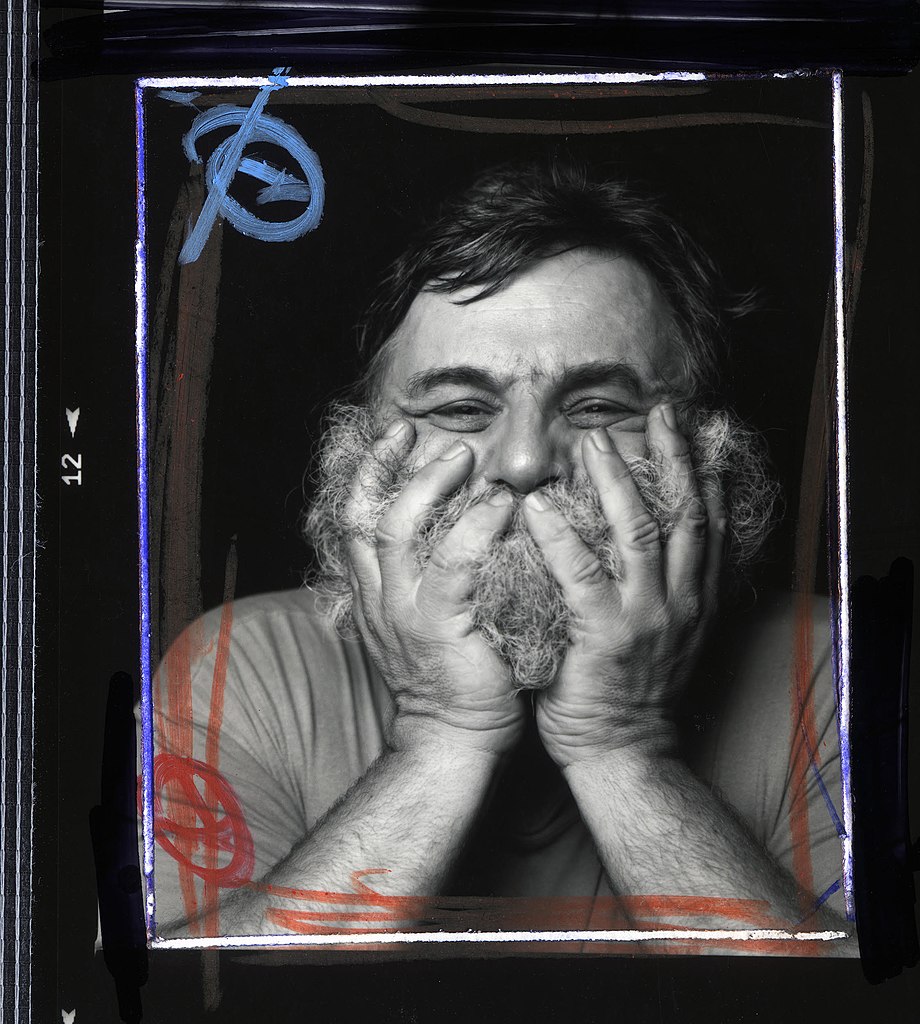
Ralf Winkler, alias A. R. Penck, was a German painter, printmaker, sculptor, and jazz drummer. A neo-expressionist, he became known for his visual style, reminiscent of the influence of primitive art.
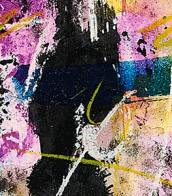
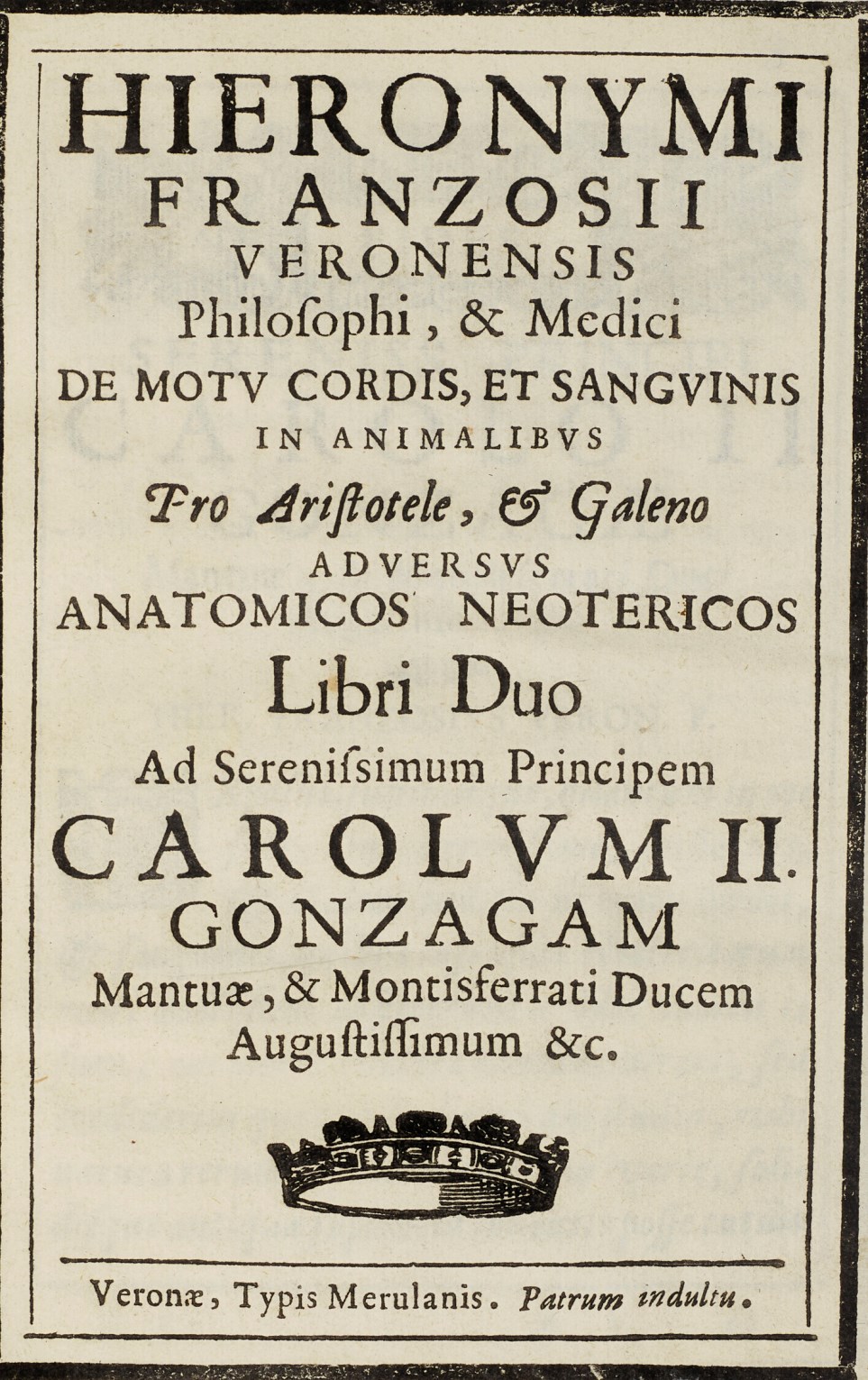
Girolamo Franzosi was an Italian physician and philosopher.
He was born in Polpenazza (now Polpenazze del Garda), near the Lombard lakeshore, in the late sixteenth and early seventeenth centuries. Franzosi was a student at Padua and became a convinced Aristotelian. He opposed the anatomists of the Neoteric Academy, which represented the new trends of medicine in Verona in contrast to the Galenic tendencies of traditional medicine.
Franzosi's other works, written under the influence of Girolamo Cardano and Agostino Nifo, deal with such wide-ranging topics as dreams, prophecies, imagination, and the medicinal properties of viper venom. He printed most of his works in Verona, calling himself "medicus and philosopher of Verona".


Aristotle (Greek: Ἀριστοτέλης) was an Ancient Greek philosopher and polymath, renowned for his profound impact on Western philosophy and science. Born in Stagira, Chalcidice, Aristotle's intellectual ventures spanned a multitude of subjects, including but not limited to physics, metaphysics, poetry, theater, music, logic, rhetoric, politics, government, ethics, biology, and zoology.
Educated in Plato's Academy in Athens, Aristotle distinguished himself as a scholar of vast knowledge and influence. His foundational works laid the groundwork for the development of modern science, while his teachings on logic and the syllogistic method continue to resonate in the realm of philosophy. As the tutor of Alexander the Great and the founder of the Lyceum in Athens, Aristotle's legacy extends beyond his prolific writings, with his teachings shaping medieval scholarship and influencing both Judeo-Islamic and Christian theologies.
Among Aristotle's notable works, his treatises such as "Nicomachean Ethics," "Politics," "Metaphysics," and "Poetics" have been studied for centuries. His concept of the "Golden Mean," advocating for a balanced and moderate approach to life, remains a cornerstone of ethical philosophy. His ideas on the "Prime Mover" and empirical evidence as a basis for understanding the world laid the foundation for scientific inquiry. Although only about a third of his original output has survived, Aristotle's contributions continue to be a subject of academic study and admiration.
For collectors and experts in art and antiques, the philosophical and scientific principles of Aristotle's works are not just historical artifacts but living ideas that continue to shape our understanding of the world and our place within it. His insights into the "good life" and the pursuit of happiness are as relevant today as they were in ancient Greece.
If you wish to stay informed about new product sales and auction events related to Aristotle, sign up for updates. This subscription is your gateway to the latest scholarly works, collections, and auctions connected to the great philosopher's legacy.





